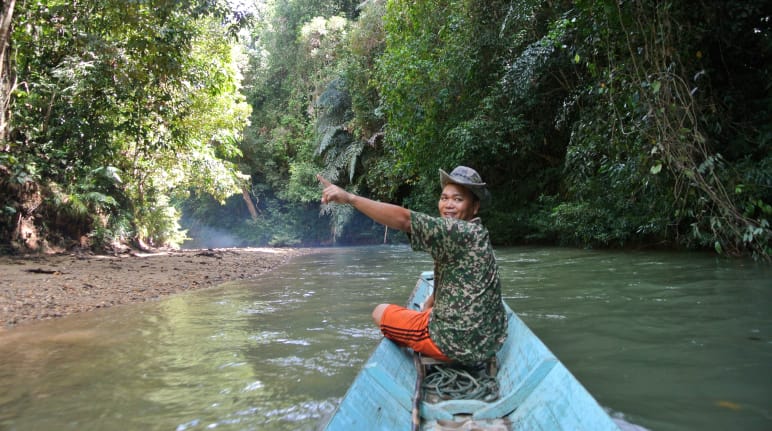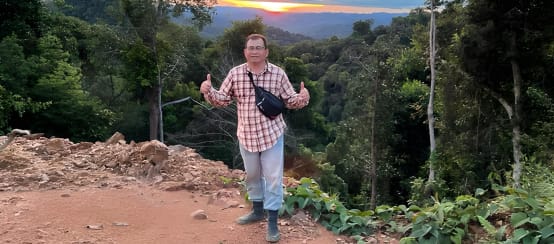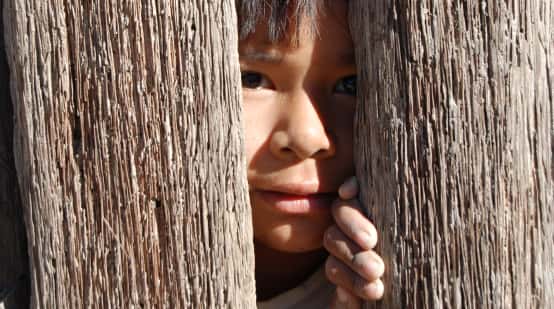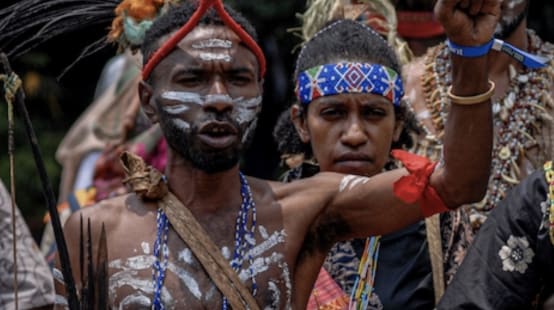NO to logging along the Ulu Lioh and Ulu Lijan rivers!
 The indigenous Iban people are front-line defenders of forests and rivers (© Rettet den Regenwald / Mathias Rittgerott)
The indigenous Iban people are front-line defenders of forests and rivers (© Rettet den Regenwald / Mathias Rittgerott)
Rainforests on the island of Borneo have a crucial role to play in the battle against climate change and extinction. Indigenous peoples in communities along the Ulu Lioh and Ulu Lijan rivers and elsewhere are campaigning for their preservation. The Iban people are fighting to keep the loggers out and need our support.
News and updates Call to actionTo: the state government and forestry department of Sarawak
“Prevent logging along the Ulu Lioh and Ulu Lijan rivers and throughout Sarawak.”
"These are the voices of the jungle," writes Matek Geram about a video he sent us on WhatsApp from Malaysia. It shows a stream bubbling gently as it flows through the rainforest. Chirping insects and birdsong can be heard in the background. Other clips show mighty trees reaching for the sky. Matek himself can be seen in several still images. The environmental activist from the indigenous organization SADIA is mapping the forest with a handheld GPS device.
The rainforests of the communities along the Ulu Lioh and Ulu Lijan rivers are in danger and mapping them is an important step toward protecting them.
Unlike many areas in the Malaysian state of Sarawak that have been destroyed by timber companies or cleared for industrial plantations, nature is still intact here. But now, apparently, a timber company is in the process of obtaining a permit to fell trees in these very forests. The villagers were not consulted and only heard about it unofficially, Matek reports.
Unless they take action, the people could lose the forest that is their home and which provided a sustainable livelihood to generations of their ancestors, and they have asked Matek for help. They are now surveying the forest to assert their traditional land rights in court.
Rainforest Rescue and Matek have been partners for many years. He is convinced that an international petition can pressure the Sarawak government and forestry administration into preserving the forests.
Matek’s position is crystal-clear: "The forests belong to the villages. They must not be touched."
Please help us raise international pressure to support the Iban people in saving their forest.
LetterTo: the state government and forestry department of Sarawak
Ladies and Gentlemen,
Rainforests are crucial to the battle against climate change and to preserve biodiversity. They are also home to numerous indigenous and other people and provide them with a sustainable livelihood.
Despite this, a logging company is apparently on the verge of obtaining a permit to log along the Ulu Lioh and Ulu Lijan rivers – the ancestral land of the indigenous Iban people.
We call on you to put respect for traditional indigenous land rights and the protection of nature, climate and biodiversity above economic interests. Please put a stop to logging, especially along the Ulu Lioh and Ulu Lijan rivers, and throughout Sarawak.
Doing so will bolster your reputation with the indigenous people, the population of Sarawak and the international community.
Yours faithfully,
How the climate and rainforests are linked
Rainforests are complex ecosystems in which a vast number of animal, plant and fungi species are tightly interdependent. They play a major role in the local and global climate: In a process called photosynthesis, plants absorb the greenhouse gas carbon dioxide (CO2) from the air. With the help of water and sunlight, they form sugar and from it other plant building blocks. In doing so, plants sequester carbon in stems, leaves and roots while releasing oxygen into the atmosphere.
According to estimates, rainforests sequester 250 billion tons of CO2, much of it in peat forests. Globally, this is equal to 90 times the man-made greenhouse gas emissions per year. 40 percent of the oxygen in the atmosphere comes from rainforests. While the metaphor of forests as the “lungs of the Earth” does not fit perfectly, it certainly does underscore their vital role.
Rainforests themselves produce a large part of the high year-round rainfall they receive. Evapotranspiration, i.e. the moisture that the plants release through their leaves, is an important aspect here. The forests are hot and humid, but the clouds reflect much of the sunlight back into space – thus cooling the atmosphere. Without this effect, the areas would be even warmer.
As carbon sinks and rainmakers, intact forests play an important role in regulating the climate and are crucial to the fight against catastrophic climate change.
The problem: catastrophic climate change and forest destruction
Rainforests are increasingly unable to act as climate stabilizers: When they are destroyed for plantations, grazing area or mining projects, vast amounts of greenhouse gases are released. For example, forest fires in Indonesia accounted for one-third of total global emissions in 1997. The loss of peat forests is particularly devastating.
According to a study published by Nature, rainforests could tip from carbon sinks to carbon emitters solely due to changing climatic and growth conditions from 2035 onward – thus accelerating catastrophic climate change.
Because of the intricate interdependencies of the rainforest ecosystem, the entire web can suffer if it is damaged in one place. Take the water cycle, for example. If drier periods occur as a result of global climate change – and this is already being observed – the cycle may break down. This can lead to evergreen, lush rainforests becoming grasslands with far lower biodiversity. The local climate would become drier and hotter.
The 18 tipping points in the climate system are particularly ominous: If, for example, climate change in the Amazon region reaches a certain point, the process and the loss of the rainforest in its current form will become unstoppable.
One thing is clear: catastrophic climate change is man-made. 98 percent of the scientists who study climate issues agree. Because the climate is a highly complex system, researchers are constantly discovering new relationships, interpreting data in different ways and revising forecasts. This is completely normal in science. However, the findings of climatologists are becoming increasingly alarming.
The solution: rainforest protection is climate protection
Rainforests must be preserved because they are indispensable as carbon sinks and their further destruction would worsen the impact of catastrophic climate change. Climate protection is therefore rainforest protection and vice versa.
- We need to preserve forests and nature and heal damage. Forests are more than just carbon sinks – they are diverse ecosystems and home to millions of people.
- We need to protect the climate while preserving biodiversity. Catastrophic climate change and extinction are two existential crises that we must tackle together.
- We need to secure and strengthen the rights of indigenous peoples, who are often the forest's best stewards: We call it the rainforest – they call it home.
- We need to fundamentally change our way of life and how we do business: This will mean reducing our consumption of energy, food and raw materials instead of maintaining it by turning to “green products”. We must stop burning fossil fuels.
- We need to reform flawed climate policy: We must end the misguided use of biofuels, especially if they are based on palm oil, soy or sugar cane, and stop burning trees in power plants.
- We reject offset programs as a modern “indulgence trade” in which companies finance environmental protection measures in return for being allowed to pollute. We also reject supposedly more climate-friendly “bridge technologies” like replacing coal with natural gas.
- In the wake of the Covid pandemic, we need to rebuild the economy and society in an environmentally sound way. There must be no economic “stimulus programs” based on old formulas.
At the same time, Covid has shown that we are capable of creating rapid and profound change in the face of an existential crisis.
Sarawak: Logging company backs down in face of local resistance

In the Malaysian state of Sarawak, a timber company had started clearing forest along the Ulu Lioh and Ulu Lijan rivers. After our partner Matek Geram mobilized local communities and organized their resistance, the company withdrew and the danger of further destruction has been averted.
Sarawak: Palm oil project off the table for good
The threat to Gunung Mulu National Park in Malaysia from the palm oil industry has finally been averted – a great success for the indigenous peoples living there. After years of protests, the Sarawak state government has now revoked the concession for the plantation.













 Recent successes
Recent successes